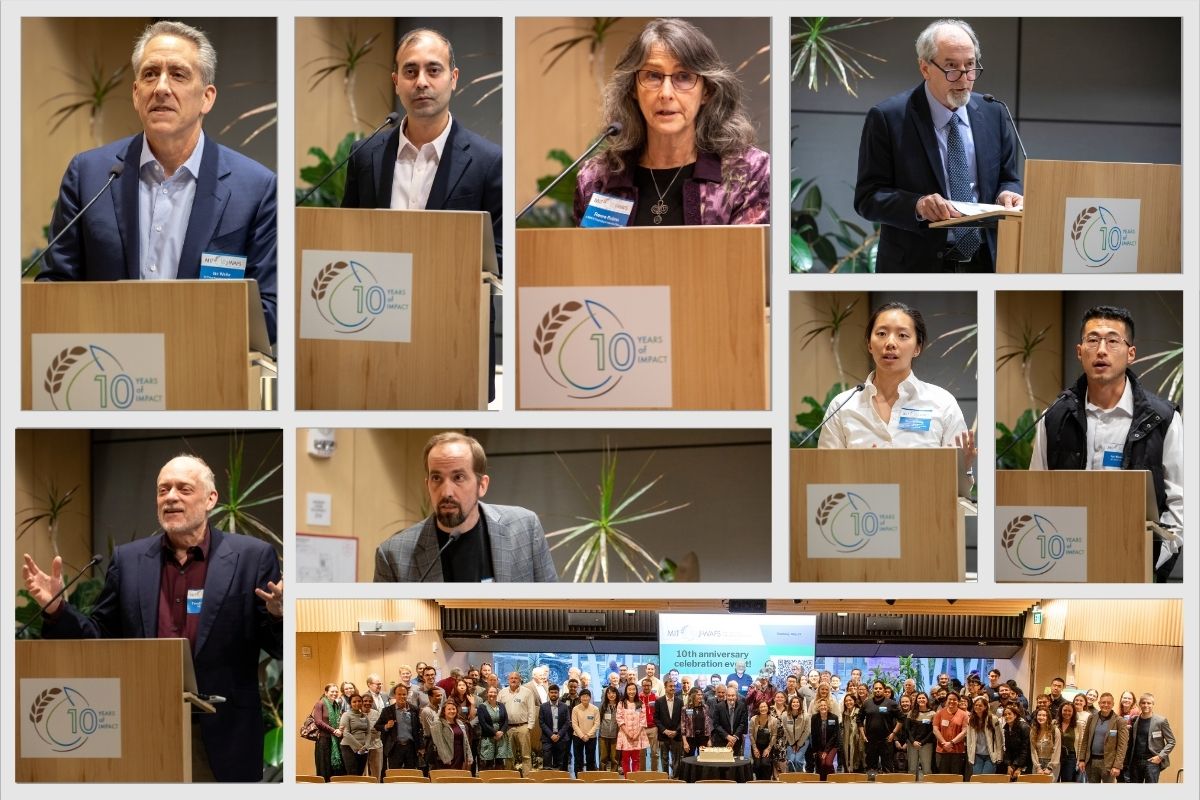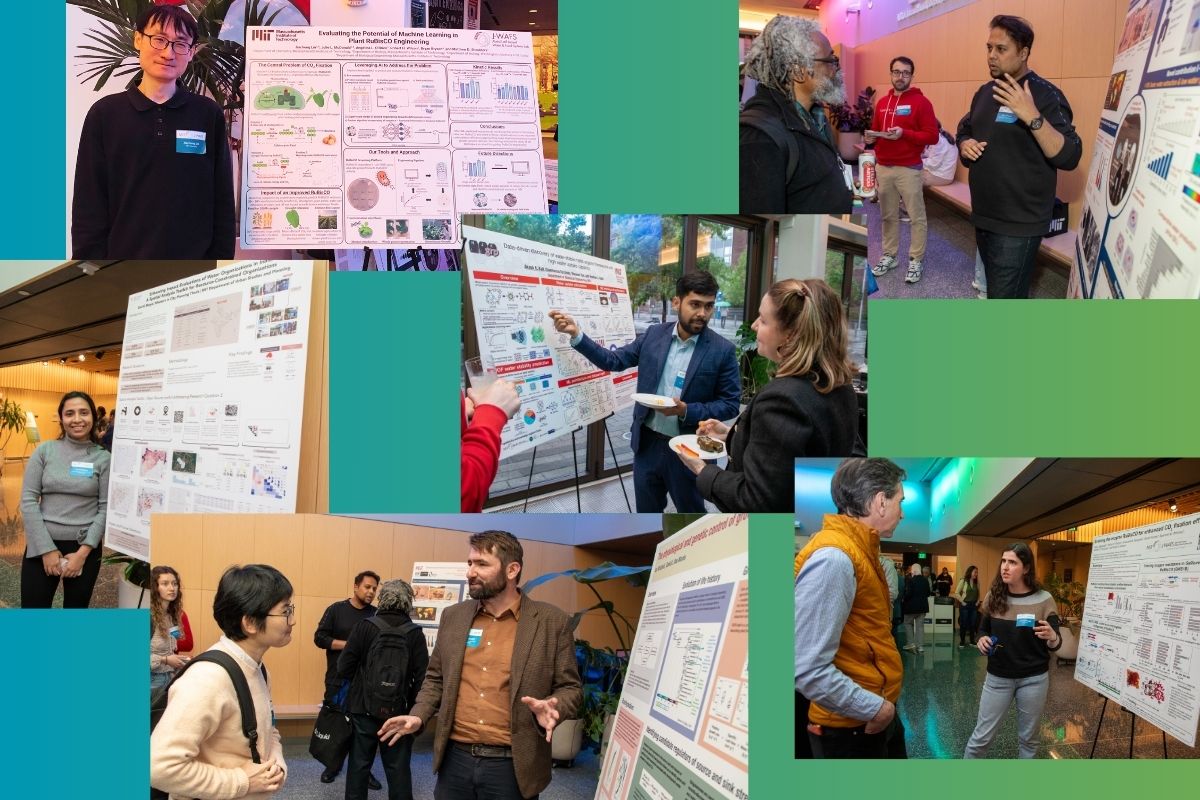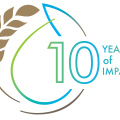News J-WAFS celebrates ten years of water and food research at a special anniversary event
Over 100 community members and friends of J-WAFS came together to recognize J-WAFS’ far-reaching impact over the past ten years.
Carolyn Blais Pinter May 29, 2025

On May 22, 2025, J-WAFS celebrated its ten-year anniversary at an event with over 100 community members and friends who ventured out despite unseasonably cold and wet weather. Held on campus in the MIT Welcome Center, the event commemorated ten years of impact that J-WAFS has made in water and food, as evidenced by a broad portfolio of innovative research projects, meaningful faculty, student, and staff relationships, and unique products and companies that have spun out of J-WAFS support.
Event programming included speeches and presentations followed by a reception with a poster session featuring work by students, postdocs, and researchers supported on J-WAFS projects. To kick things off, MIT Vice President for Research Ian Waitz provided opening remarks, followed by talks from the J-WAFS leadership team—John Lienhard, Renee Robins, and Rohit Karnik. In addition, a congratulatory letter to J-WAFS from MIT President Emeritus L. Rafael Reif was read by J-WAFS director of external relations Longzhen Han, who also acted as the emcee. The formal part of the program concluded with select J-WAFS community members, who spoke about their projects and interactions with J-WAFS. You can read more about each talk below.
In addition to highlighting ten years of J-WAFS’ trailblazing work, the celebration was an opportunity to honor J-WAFS founding director John Lienhard and founding executive director Renee Robins and wish them well as they retire this summer. Their dedication, steady leadership, strategic insights, and empathetic management made J-WAFS into the successful program it is today—MIT’s preeminent water and food research hub. J-WAFS has distributed over $25M in funding to 400 members of the MIT community, spanning 40 department, labs, and centers across all five schools and the college of computing.
Many of the speakers acknowledged the central role Mohammed Jameel and Community Jameel played in J-WAFS’ founding, having made the generous gift that launched J-WAFS. Other donors and supporters over the years have also been critical to helping J-WAFS carry out its mission to secure safe water and food for the planet. Appreciation for these important patrons was conveyed throughout the event.
Below, learn more about the talks, presentations, and interactive programming that took place during the event.

Event Speakers
- Ian Waitz, MIT Vice President for Research and Jerome C. Hunsaker Professor of Aeronautics and Astronautics
Waitz offered perspective on J-WAFS’ place in the greater Institute ecosystem. He noted that J-WAFS plays a unique role in connecting the Institute’s formidable strengths across research, education, and innovation to bring a systems-based approach to the most basic of human needs of water and food.
He discussed how the lab was initially part of MIT’s efforts to create an interdisciplinary initiative focused on the environment. Over the last 10 years, Waitz said, it has only become clearer that the health of the world’s water and food systems is also a matter of policy and governance, urban planning, economics and trade, security, geopolitics, and cooperation. Therefore, the mission of J-WAFS is a challenge worthy of MIT’s focus and commitment. Waitz thanked President Emeritus Rafael Reif, whose strategic insight and advocacy set the program in motion, and Mohammed Jameel, founder and chair of Community Jameel, whose extraordinary generosity enabled the founding of J-WAFS.
“J-WAFS has been a success in only ten years, which is not easy to do,” Waitz commented. “Here’s to the next ten years,” he concluded.
- L. Rafael Reif, MIT President Emeritus and Ray and Maria Stata Professor of Electrical Engineering and Computer Science
In written remarks from Reif that were read on his behalf at the event, Reif described the launch of J-WAFS as “one of the most important accomplishments during my tenure as president of MIT.” He went on to explain how, during his presidency, one of the global problems that concerned him the most, and where he believed MIT had the most to contribute, was the need for freshwater for a growing population during a time of climate change. Reif connected Professor John Lienhard with Mohammed Jameel, who gave the gift that launched J-WAFS. Reif expressed gratitude to J-WAFS leadership and Community Jameel for “building this successful asset for MIT—an asset that makes me feel extremely proud.”
- John Lienhard, Abdul Latif Jameel Professor of Water and Mechanical Engineering and Founding Director of J-WAFS
Lienhard explained that as far back as 2005 he began reading about water scarcity around the world. He saw that his background in transport phenomena could be applied to water purification technologies, and he moved his research fully into water. He held many discussions with colleagues at MIT to coordinate who was working in water and how. In 2011 he worked with other faculty to organize the Rethinking Water symposium, and in 2012 he was part of a proposal to academic council for a major environmental program. Later, he again spoke with MIT professors to write a report on what kind of large-scale environment-related activities might be initiated at MIT. Both water and food issues figured prominently. When Rafael Reif asked John to discuss the report with Mohammed Jameel, a CEE alumnus and the benefactor of J-PAL, Jameel was inspired and wanted to endow a lab focused on water and food.
Lienhard went on to thank: “Rafael Reif, who saw the importance of water and food and who had confidence in my leadership. Second, Mohammed Jameel for his generosity and for his belief that MIT is uniquely positioned to make a better world. And finally, Renee Robins, my primary partner in building J-WAFS and herself a strong leader and strategic thinker.”
Read John Lienhard's full remarks by clicking here.
- Renee Robins, J-WAFS Founding Executive Director
Robins opened her talk by thanking John Lienhard and noting “the accomplishments that are possible when smart, dedicated people come together to work on hard problems.” Focusing her remarks on J-WAFS’ impact over the past 10 years, she cited the fact that J-WAFS has supported over 100 professors, or 10% of the MIT faculty. “But the numbers don’t capture the full story,” she noted. “J-WAFS has inspired diverse researchers from all parts of the Institute to consider how their capabilities and expertise can be applied to water and food challenges. We’ve emphasized innovation and implementation, encouraging research that leads to real-world solutions—whether in the form of new technologies, policy guidance, or novel business models. And perhaps most importantly, we’ve brought faculty, students, and research staff together to be exposed to unfamiliar problems and new methodologies, to explore how their expertise might be applied, to learn from one another, to collaborate, and to build a vibrant, committed community.”
She closed by thanking John, Rohit, the J-WAFS staff, partners at MIT, Community Jameel and other supporters, plus the many colleagues from earlier in her MIT career.
Read Renee Robins' full remarks by clicking here.
- Rohit Karnik, Tata Professor of Mechanical Engineering and Director of J-WAFS
Karnik began by expressing how it is an honor to be selected to serve as the next director of J-WAFS, and discussed his long history with the program, as a recipient of multiple grants for different projects, as associate director, and now as director. He expressed how a member of the J-WAFS director search committee described J-WAFS as “a gem.” Karnik expanded on the analogy, saying that what makes J-WAFS a gem is the J-WAFS community—members of the MIT research community who care about the challenges of water and food, and friends and supporters of J-WAFS. He thanked MIT leadership, John, Renee, J-WAFS staff, all the researchers, collaborators, advisors, donors, and the Jameel family, as well as colleagues at Community Jameel and ALJ.
In looking ahead, Karnik urged the J-WAFS community to strive to “seek to better understand food/water systems, to identify challenges and opportunities, to talk to colleagues, brainstorm, collaborate, to apply our creativity and ingenuity, to provide support in whatever way that best suits us, and thus, to participate in shaping the future of food and water systems and in developing solutions to secure humankind’s vital resources.”
Read Rohit Karnik's full remarks by clicking here.
Community Talks
- Sherrie Wang, Brit (1961) & Alex (1949) d'Arbeloff Career Development Assistant Professor, Mechanical Engineering and Institute for Data, Systems, and Society
Sherrie Wang spoke about her seed grant project to create a national crop map of India. The assistant professor started her role at MIT about two years ago and said that the J-WAFS grant was among the first funding she received, which helped to launch her lab. In her presentation, she described how crop maps do not exist in much of the world, yet they are an essential source of information for monitoring yield progress, projecting global crop production, and planning effective agricultural policies. Wang is using deep learning, roadside imagery like Google Street View images, and satellite data to map crops across India, which is home to 125M smallholder farmers and currently has no crop type maps for public use.
- Matt Shoulders, Class of 1942 Professor of Chemistry
Matt Shoulders is currently leading the inaugural J-WAFS Grand Challenge project, which aims to advance agriculture by genetically engineering a better RuBisCO enzyme. This photosynthetic enzyme is responsible for converting carbon dioxide (CO2) into the sugars and cellulose that plants need to grow. But it’s significantly slower than other enzymes, providing opportunity to make it more efficient, and thereby improve crop yield. His team—made up of researchers across MIT and external collaborators—is using advanced tools in molecular biology and computer science to try to make demonstrable improvements in the enzyme’s functionality.
“One of the greatest strengths of J-WAFS is their extremely thoughtful proposal process in which they bring together interdisciplinary teams,” Shoulders said in closing.
- Jon Bessette, Doctoral Student, Mechanical Engineering
Jon Bessette discussed his journey as an active J-WAFS community member, having first received a J-WAFS Travel Grant to attend Stockholm World Water Week in 2022. There, he met fellow Travel Grantee Gokul Sampath. Despite Jon being an engineer and Gokul being a social scientist, they discovered they shared many overlapping interests in water research and international development. They discussed how they might combine their areas of expertise to address the global data gap on water fetching practices in places like rural India. In 2023, the duo applied for and received a J-WAFS India Grant to develop a novel sensor to automate data collection of water fetching practices in arsenic affected villages in West Bengal. Both Bessette and Sampath later went on to become J-WAFS Fellows.
“What began as an informal conversation in Stockholm turned into a project with real-world impacts in India,” Bessette noted.
- Tim Swager, John D. MacArthur Professor of Chemistry
Last but not least, Tim Swager concluded the presentations by highlighting the new areas of research that J-WAFS funding has enabled for his lab. For example, he explained that a J-WAFS Solutions Grant led to the creation of Xibus Systems, a company commercializing sensors for pathogen detection in food. In another project, supported by J-WAFS Research Affiliate company Xylem, Inc., Swager helped develop ultrafast PFAS detection, which led to another spinout called Fluorityx. “This collaboration wouldn’t have happened without J-WAFS,” Swager said. “The support has been transformational and has really impacted my career,” he added.
Swager also commented that “the magic of J-WAFS has been to help people explore new areas but also give them room to fail.” He went on to state, “J-WAFS has been a well-oiled machine from day one and a first-class operation. Centers like this are what keep MIT competitive.”
Interactive Programming
Poster session
Outside the auditorium in the reception space, J-WAFS held a poster session with the work of eight different researchers. Attendees could interact with the presenters, asking questions and gaining insights into each project. All attendees were given a red ticket at check-in, and at the end of the night, they were encouraged to vote for their favorite poster. After tallying the votes, Julie McDonald was declared the winner. McDonald is a PhD candidate in the Department of Biology and a member of Matt Shoulders’ lab, where she works on the J-WAFS Grand Challenge project that studies RuBisCO. Specifically, she is developing and applying next-generation in vivo continuous evolution to gain a better understanding of the RuBisCO sequence-structure-function relationship.
Each presenter and their poster title are listed below.
- Akash Ball, J-WAFS Fellow: Computational discovery of water-stable metal-organic frameworks with high water uptake capacity for next-generation membranes
- Jon Bessette, J-WAFS Travel Grantee, J-WAFS India Grantee, and J-WAFS Fellow: Desalinating water straight from the sun
- Smriti Bhaya, J-WAFS Travel Grantee: Enhancing Impact Evaluations of Water Organizations in India: A Spatial Analysis Toolkit for Resource-Constrained Organizations
- Jiacheng Lin, postdoc working on the J-WAFS Grand Challenge RuBisCO project: Evaluating the Potential of Machine Learning in Plant RuBisCO Engineering
- Ian McCahill, postdoc working on a J-WAFS Seed Grant with Professor Dave Des Marais: The physiological and genetic control of growth rate variation in Brachypodium
- Julie McDonald, PhD student working on the J-WAFS Grand Challenge RuBisCO project: Evolving the enzyme RuBisCO for enhanced CO2 fixation efficiency
- Ikra Shuvo, PhD student working on a J-WAFS Seed Grant with J-WAFS researcher Svetlana Boriskina: Breaking the thermal limit of atmospheric water harvesting with vibrational
- Greg Sixt, PhD, J-WAFS research manager for climate and food systems and director of the J-WAFS-led Food and Climate Systems Transformation (FACT) Alliance: The Jameel Index for Food Trade & Vulnerability

Partcipants in the J-WAFS 10th anniversary poster session
Trivia cards and documentary viewing
Scattered throughout the reception hall on tables, were trivia cards where attendees could test their knowledge of water and food facts and statistics and scan a QR code to learn about related J-WAFS research.
A monitor was also set up so that event attendees could watch a special sneak-peak screening of a documentary on water conservation and treatment. The short film was commissioned by Community Jameel and produced by students at Massachusetts College of Art and Design (MassArt), led by Professor Tammy Dudman. The film features the work of MIT Professor Patrick Doyle and his team, who are supported by a J-WAFS Solutions Grant. Their project involves the creation of a hydrogel system to remove micropollutants from water.
